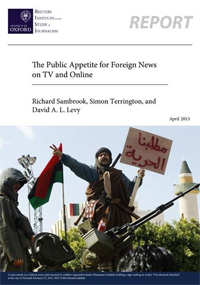The Public Appetite For Foreign News on TV and Online
Posted by Richard Sambrook
There are some long accepted wisdoms in the debate about the future of News. For example, that audiences are relentlessly drifting from the old analogue platforms and services to the advantages of digital platforms; that in the plentiful digital market place there is less space or justification for public service intervention; and it has been a long held truth that audiences are less interested in foreign news and tend to switch away from it. However, the real picture may be more complicated.
2010 – 2011 was a remarkable year for international news: the Arab spring, the Chilean miners rescue, the Haiti earthquake, Japan’s Tsunami, extreme floods in Pakistan and more. So what can the news coverage of these events tell us about the public appetite for international news – and how people choose to follow the news.
 The Reuters Institute for the Study of Journalism has looked at the BBC’s coverage online and on its main TV bulletins – and has looked at the audiences’ behaviour. There are some surprises.
The Reuters Institute for the Study of Journalism has looked at the BBC’s coverage online and on its main TV bulletins – and has looked at the audiences’ behaviour. There are some surprises.
Firstly, TV bulletins still rule. In spite of all the discussion of the merits of online, of social media, of interactivity, choice and convenience it was clear that more people got their news of these big international events from the main bulletins at 6 and 10 on BBC1 than from the BBC website. (We were unable to include mobile, news channels or radio in the analysis – although we know those audiences are smaller)
Online audiences, even when aggregated, struggled to meet 75% of the audience for the TV programmes – and were, unsurprisingly, more volatile. Furthermore, the figures for online readership of these events often lagged behind the TV broadcasts – in other words, TV drove audiences online.. Viewers to the 6 or 10 were offered coverage of the initial protests in Egypt for example a full day before the online readers for the story really started to rise. So editors of the main TV bulletins still set the agenda for other outlets and platforms and provide the mass viewing experience. We found no evidence of online coverage driving TV viewing.
Secondly, audiences have minds of their own. The BBC offers a more domestic remit for the Six O’Clock News and a more international remit for the 10. Audiences however simply took the news where they chose, with higher figures for international news at 6 on many major events in spite of the BBC’s preferred weighting. In addition, where TV programmes offered very extended coverage of the biggest stories, audiences tended to switch away after 15 -20 minutes rather than remain for the full menu of angles and analysis. TV editors may have decided Japan’s Tsunami or Mubarak’s resignation merited a full programme of coverage – viewers tended to disagree and decide for themselves when they’d seen enough.
Further, placement or duration of coverage seemed to have little relationship to viewing figures – or to put it another way, BBC editors were not driven by audience interest alone in their editorial decisions. It was clear they took an independent view of the global significance of events rather than purely the likelihood of building a big audience.
Finally, although when asked audiences say they prefer domestic news to international news, and most news editors will say that a foreign story loses readers or viewers, it was clear for the most significant events this wasn’t true. A major international event can add 20 per cent to a programme’s average audience and even less compelling foreign stories rarely lose more than 10 or 15 per cent of the audience.
This indicates the continuing importance of TV coverage to inform audiences about events of public interest which online seems less fit to do due to the self selection of items. This public interest purpose and functionality of TV news, along with its mass audience, needs to be taken greater account of in the debate about the drift of news audiences to digital platforms.
Full report “The Public Appetite For Foreign News on TV and Online” from the Reuters Institute for the Study of Journalism is available here: https://reutersinstitute.politics.ox.ac.uk/about/news/item/article/online-audiences-less-interested-in.html
Authors:
Prof Richard Sambrook, Cardiff University
Dr David Levy, Director, Reuters Institute for the Study of Journalism
Dr Simon Terrington, Visiting Fellow, Reuters Institute for Study of Journalism

